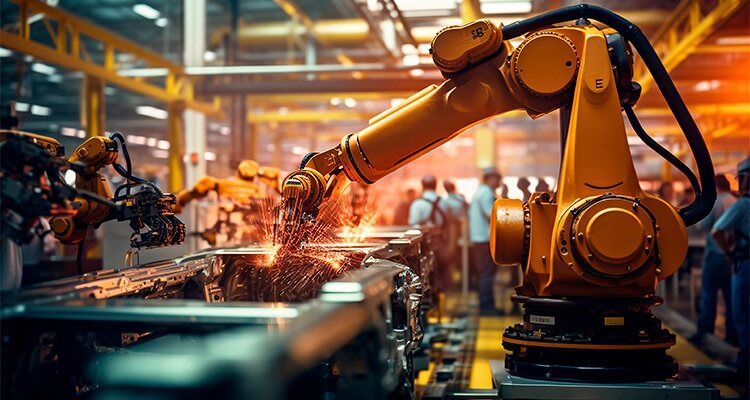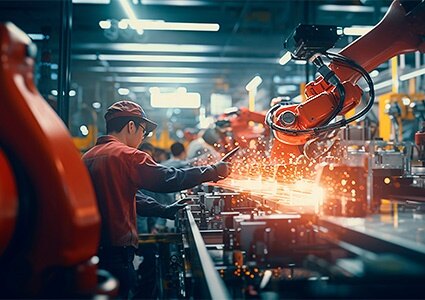
Discover how Ethan Karp is helping to drive Northeast Ohio’s manufacturing growth by supporting small- and mid-sized manufacturers
As President and CEO of MAGNET, which is part of the Manufacturing Extension Partnership (MEP) National Network, Dr Ethan Karp has helped hundreds of manufacturing companies grow through technology, innovation and talent. Passionate about driving economic prosperity in Northeast Ohio, Ethan is a committed change-maker and community builder.
Before joining MAGNET in 2013, Ethan worked with Fortune 500 companies at McKinsey & Co. He attained undergraduate degrees in biochemistry and physics

from Miami University and a Ph.D. in Chemical Biology from Harvard University. “I grew up in rural Pennsylvania,” he begins, “but went to Cleveland with an offer to join McKinsey. I did a range of consulting work but really wanted to feel a local impact, and ultimately, helping multibillion dollar companies wasn’t where I was going to get that feeling. So, I joined MAGNET, which was the pilot site for the MEP program.”
Founded in 1984 as a nonprofit organization, MAGNET is the Northeast Ohio partner of the Ohio MEP, which is part of a national network of MEPs created through the US Department of Commerce’s National Institute of Standards and Technology’s MEP. MAGNET and other MEP Centers are dedicated to helping small- and medium-sized manufacturers increase sales, create jobs and generate cost savings through technological innovation, workforce training and improved management practices. This public-private partnership allows MAGNET to offer affordable consulting services to Northeast Ohio manufacturers.
“Organizations can often lose their way over time,” Ethan continues, “and over the last ten years since I joined MAGNET, we have really tried to reinvigorate the sector, focusing on how we can help manufacturers to thrive. I’m fortunate to experience that transformation in person. A considerable proportion of what we do is workforce focused. We’re helping the region figure out how to raise people out of poverty, and into manufacturing jobs, ultimately creating a positive impact on the community. From acquiring other nonprofits to launching a regional strategy around manufacturing, we have worked on numerous initiatives in support of the sector.
People first
“We are a service business, but everything we do is about people. At MAGNET we create a culture that attracts good talent; people want to be here. In terms of the people aspect of leadership, I’ve seen it all, the good and the bad, but irrespective, this is the element of business that I really enjoy. It’s what gets me super excited and what ultimately drives us as an organization,” he asserts.
MAGNET’s diverse team of manufacturing experts use their skills and expertise to offer consulting services and talent development. “From lean manufacturing to plant layout and scrap reduction, we’re able to advise on all aspects under the operations umbrella,” Ethan continues. “This also includes leadership development and how managers can relate to their people to drive staff retention and improve company culture. We also have a large engineering department which designs and builds new products, and custom and complex automation equipment for start-ups and existing companies. We recommend the most appropriate technologies to enhance capacity and efficiency in manufacturers.
“The smallest of our consulting practices, but no less important, is our sales and marketing and strategy service line. Our portfolio of customizable solutions can help businesses to focus on the right direction, identify opportunities and adapt to an ever-changing market to attract, convert and retain customers in a profitable and sustainable way. Additionally, our new ventures team works with physical product and hard tech startup companies to transform ideas into businesses. By asking innovators fundamental product development questions, we can ensure customers will get the solutions they need. Alongside our consulting service lines, we have our workforce talent development offering, which is different because it’s not a one-on-one service. You can’t solve workforce issues without fixing a systems level problem,” Ethan explains.
Manufacturers and potential employees alike are experiencing a workforce-related disconnect. Companies are unable to land qualified employees to fill their available roles. Separately, individuals are unaware of the professional training, growth, and opportunities manufacturing offers and how to qualify for them. The MAGNET team works directly with partner manufacturers to build a dedicated talent pipeline through various professional training programs that qualify people for well-paying, stable manufacturing jobs, with the aim of bridging the gap between job seekers and job fillers.
“Many organizations believe that if they fix one aspect of their workforce issue that the overall problem will be resolved. However, the reality is that the issue encompasses wider societal barriers such as poverty or lack of transport. As such, we’ve taken on the role of intermediary. We recruit from within our historically overlooked communities and run programs that enable students to gain hands-on experience in manufacturing facilities. We take that exposure experience and put students into a European-style apprenticeship program that we’ve developed over the last few years. We’re also innovating around employment straight out of senior year.
Doing better, doing differently
“We strive to connect the various pieces, from transportation to training, whether for folks out of the criminal justice system or those that don’t have a job. We’ve created a whole professional development system to help coaches get better at coaching people into manufacturing jobs. We have a strategy, called The Blueprint, which aligns with our vision for our region to be a global leader in smart manufacturing. Everything we do is designed to help the region get excited about creating a thriving economy based in manufacturing over the next 20 years,” he enthuses.
 “Our community has an abundance of riches and opportunities when it comes to philanthropic activity based on economic development. Over the years, however, it’s meant that lots of different organizations end up doing lots of different things. In response, MAGNET decided to put a vision out there, to start a drumbeat to which everybody could align, with the aim of encouraging collaboration. We wanted to offer a sense of cohesion that spurs industry into doing more and doing differently. Two years later, we’re now reporting on how we’re doing against the KPIs we put out there as a region. The four themes of The Blueprint mirror what we do at MAGNET.
“Our community has an abundance of riches and opportunities when it comes to philanthropic activity based on economic development. Over the years, however, it’s meant that lots of different organizations end up doing lots of different things. In response, MAGNET decided to put a vision out there, to start a drumbeat to which everybody could align, with the aim of encouraging collaboration. We wanted to offer a sense of cohesion that spurs industry into doing more and doing differently. Two years later, we’re now reporting on how we’re doing against the KPIs we put out there as a region. The four themes of The Blueprint mirror what we do at MAGNET.
Talent, transformation, technology
“One is talent, and manufacturers need to look for talent in different places. The second component is transformation. Technology is to smart manufacturing what coal was to the original steel mills. It fuels modern production, and we can’t win without it. If companies do not adopt Industry 4.0, they will fall behind. While 30 percent of companies have been accelerating the transformation to digital technology, that means the other 70 percent still aren’t doing anything, which is worrisome, particularly when other countries are. The third pillar is innovation. It’s about using technology to make new ideas come to life. It’s relentlessly looking at your products, services, and ways of working and seeking to make them better — that’s where the opportunities lie. The final element is leadership. We need bold leadership at every level to lead the world in smart manufacturing. It’s crucial for leadership to be prepared to take risks. From creating a better culture or paying people more to investing in technology, whatever the change, ownership needs to take a risk. The Blueprint is designed to motivate and inspire manufacturing leaders to take risks.
Championing the sector
“Northeast Ohio is approximately 50 percent dependent on manufacturing and 95 percent of those companies are small. The region’s other industries, such as healthcare, education, insurance, and finance are conversely dominated by very large companies. In terms of the community, the best way for us to lead is to help the smaller companies, without which we would be nowhere as an economy,” Ethan explains.
“If we don’t lock arms, community by community, then nothing will change. From talent acquisition to improved pay, while there are many industry barriers to overcome, fundamentally, the greatest is the need for systemic change. From my observation of technology adoption, it’s quite complex. Until recently, if an organization was assessing the costs versus benefits of upgrading to a new machine, a decision would have been relatively straightforward. When we consider modern technology, however, we’re in a totally different realm. Figuring out how robotics fit into the flow of an organization’s operations, for example, requires much greater consideration, and time and expertise that perhaps simply isn’t available. Again, many of these challenges are also underpinned by leadership’s willingness to take risks.
Supporting systemic change
“If everybody’s mindset shifted,” he continues, “then many of these issues would be resolved. Many manufacturers we talk to are generally unwilling to pay for expertise, whether internal or external. One of the reasons the MEP exists is to change mindsets and enable manufacturers to get outside help. We aim to provide the same sort of expertise that large companies can access, but fundamentally at a price point that smaller organizations are prepared to pay. I don’t believe we will get that full mindset shift but we’re working on it. If a certain technology has been adopted by a neighboring manufacturer, then we’ll take other manufacturers to that facility to showcase the benefits of adoption. We call these facilities lighthouses. If seeing the technology in action spurs adoption, then we’ll show manufacturers how they can replicate it in their own environments.”
Ethan goes on to highlight that alongside these challenges, the sector is also facing shifting market dynamics. “The manufacturing industry is changing. While it’s important for organizations to adopt technology moving forward, it’s not always necessary for every company to focus on every shift. The enduring legacy of a company will be based on its people. Acquiring and retaining the best talent, at all levels, will increase exponentially if you are the employer of choice, because you pay well, and you treat your people well. Manufacturing is a harder field to go into in terms of the type of work generally involved and the slightly more intense environment. As such, people need to be remunerated accordingly. The best way to insure yourself against business cycles or recessions is to have the best innovations and the best people. These are the ingredients that really create value.
“Northeast Ohio may not be unique, but it is special,” Ethan elaborates. “We’re dependent on manufacturing and our region is fundamental to the supply chain. Everything we do, at MAGNET and as part of the MEP National Network, is to show a brighter future for existing manufacturers and their workers. America is still the second top producer, and we need to bolster our position for national security, for jobs, and for everything in between. Manufacturing built the middle class for America, and it should and can do so again. Our manufacturers are somewhat hidden today, but there is tremendous pride in what they do, and we want to boost that pride to propel people to get onto this career path. We want to reignite that pride and remind people how many families are fed because of manufacturing,” he concludes. “I feel immense pride in my adopted industry here, and I know that everybody who gets to know manufacturers and the people who work in the sector also feels that pride.”